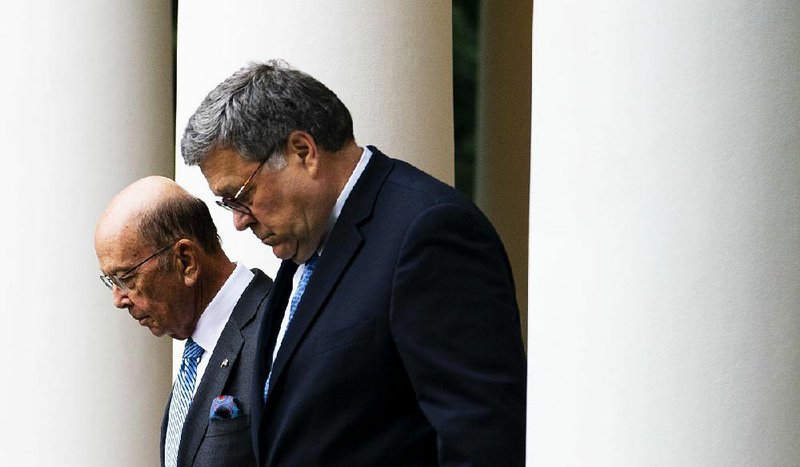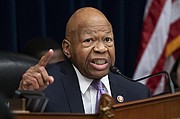WASHINGTON -- The Democratic-controlled House voted Wednesday to hold two top officials in President Donald Trump's administration in contempt of Congress for failing to comply with subpoenas related to a decision to add a citizenship question to the 2020 census.
The House voted 230-198 to hold Attorney General William Barr and Commerce Secretary Wilbur Ross in criminal contempt. The vote is largely symbolic because the Justice Department is unlikely to prosecute the two men.
The four members of Arkansas' delegation, all Republicans, voted against the measure.
Trump abandoned the citizenship question last week after the Supreme Court said the administration's justification for the question "seems to have been contrived." Trump directed agencies to try to compile the information using existing databases.
The White House called the vote "ridiculous" and "yet another lawless attempt to harass the president and his administration."
The Justice and Commerce departments have produced more than 31,000 pages of documents to the House regarding the census issue, and senior officials from both agencies, including Ross, have spoken on the record about the matter, the White House said, adding that Democrats continue to demand documents that the White House contends are subject to executive privilege.
"House Democrats know they have no legal right to these documents, but their shameful and cynical politics know no bounds," White House press secretary Stephanie Grisham said in a statement.
Democratic Rep. Elijah Cummings of Maryland, chairman of the House Oversight and Reform Committee, said the contempt vote was an important step to assert Congress' constitutional authority to serve as a check on executive power.
"Holding any secretary in criminal contempt of Congress is a serious and sober matter -- one that I have done everything in my power to avoid," Cummings said during House debate. "But in the case of the attorney general and Secretary Ross, they blatantly obstructed our ability to do congressional oversight into the real reason Secretary Ross was trying for the first time in 70 years to add a citizenship question to the 2020 census."
While Ross and other officials have claimed the sole reason they wanted to add the citizenship question was to enforce the Voting Rights Act, "we now know that claim was nothing but a pretext," Cummings said. "The Supreme Court said that."
At the direction of Barr and Ross, "the departments of Justice and Commerce have been engaged in a campaign to subvert our laws and the process Congress put in place to maintain the integrity of the census," Cummings said.
The contempt resolution "is about protecting our democracy, protecting the integrity of this body. It's bigger than the census," he said.
Ross called the vote a public relations "stunt" that further demonstrates Democrats' "unending quest to generate headlines instead of operating in good faith with our department."
Democrats prefer to "play political games rather than help lead the country" and "have made every attempt to ascribe evil motivations to everyday functions of government," Ross said.
Ross told the oversight committee that the March 2018 decision to add the question was based on a Justice Department request to help enforce the Voting Rights Act.
Democrats disputed that, citing documents unearthed last month and suggesting that a push to draw legislative districts in overtly partisan ways was the real reason the administration wanted to include the question.
Democrats feared that adding the question would reduce participation in immigrant-heavy communities. They have pressed for specific documents to determine Ross' motivation and contend the administration has declined to provide the material despite repeated requests.
"The real issue we should be debating" is why Democrats are afraid to ask how many citizens live in the United States, said Rep. James Comer, R-Ky. Comer said that contrary to Democrats' claims, Ross and other officials have cooperated with the oversight panel and provided thousands of documents.
"If the Democrats can't impeach President Trump, they will instead hold his Cabinet in contempt of Congress," he said. "This is just another episode in political theater."
Trump has pledged to "fight all the subpoenas" issued by Congress and said he won't work on legislative priorities, such as infrastructure, until Congress halts investigations of his administration.
"Why are they doing this? Why are they doing this? All because they don't want a simple question on the census," said Rep. Jim Jordan of Ohio, the top-ranking Republican on the oversight committee. "This resolution is ridiculous, and we should vote it down."
The Justice and Commerce departments maintain that they have sought to fully cooperate within legal bounds with the oversight panel's requests. Democrats, they argue, are more interested in a political clash that can attract media attention and embarrass the administration than they are in actual fact-finding. The agencies accuse Democrats of prematurely abandoning the negotiating table.
Barr and Ross dispatched a last-minute letter to Speaker Nancy Pelosi of California on Wednesday, urging her to call off the vote. The materials the committee had demanded, they said, would require violation of legal privileges and executive privilege.
"The key remaining issue is how the departments and the committee will address the material that is protected by privileges that have been repeatedly affirmed by the courts," they wrote. "There is no information to hide; there are institutional integrities to preserve."
The United States used to include a citizenship question on all census forms, but since 1950, it has appeared only on a longer, more detailed questionnaire sent at random to a small number of households and not on the forms that most residents receive.
Government experts have predicted that asking respondents their citizenship status would scare many immigrants away from responding to the census, which counts all people living in the United States, not just citizens. It could ultimately result in an undercount of about 6.5 million people, the experts say.
States rely on raw population data, rather than eligible voters, to draw House districts and to determine access to federal social welfare programs. Democrats were fearful that a significant undercount could reduce their representation and affect how hundreds of billions of dollars in federal spending are distributed.
Information for this article was contributed by Matthew Daly of The Associated Press and by Nicholas Fandos of The New York Times.
A Section on 07/18/2019

